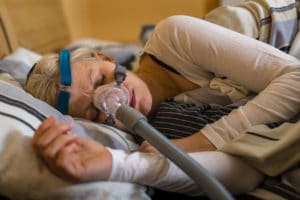Can Sleep Apnea Cause Atrial Fibrillation (Afib)?

Atrial fibrillation (Afib) is a serious heart condition impacting approximately six million Americans. It is caused by a quivering or irregular heartbeat which prevents the upper chambers of the heart, called the atria, from contracting properly. This causes blood to pool in the atria, increasing your risk of a clot. If these blood clots enter your bloodstream, they can trigger a stroke. In fact, individuals with atrial fibrillation are five times more likely to have a stroke than people who don’t suffer from this heart condition.
While there are a variety of potential causes of Afib, there is growing evidence linking obstructive sleep apnea as a significant risk factor for the condition. In addition, this research finds that addressing your sleep apnea in conjunction with Afib treatment can lead to better outcomes and a reduced risk that atrial fibrillation will recur in the future.
What Is Sleep Apnea?
Obstructive sleep apnea is a condition that results in brief interruptions in breathing while you sleep due to a blockage in your airway. In order to resume normal breathing, your brain must rouse you from sleep. This pattern can happen hundreds of times a night without you even realizing it’s happening.
The reduced oxygen to your brain and disruption to your sleep patterns caused by sleep apnea can increase your risk of a variety of serious health issues, including:
- Heart attack
- Stroke
- Diabetes
- High blood pressure
- Depression
- Atrial fibrillation
- Cardiac arrhythmia
- Gastric reflux
- Fibromyalgia
What Is the Relationship between Sleep Apnea and Afib?

- Individuals with sleep apnea are four times more likely to develop Afib than people who don’t suffer from sleep apnea
- Roughly 50% of atrial fibrillation patients also suffer from sleep apnea
- When sleep apnea is left untreated, it can result in conditions which increase your risk of Afib such as diabetes, high blood pressure, obesity and heart disease
- Sleep apnea triggers cardia arrhythmias during sleep, and this can potentially result in the development of atrial fibrillation
- For individuals who experience both conditions, treating sleep apnea has been shown to improve Afib
- When left untreated, sleep apnea has been shown to reduce the overall effectiveness of Afib treatments such as electrical cardioversion and catheter ablation, and it increases the risk of experiencing a recurrence of atrial fibrillation after these treatments have been administered
- When both conditions exist, you’re more likely to experience better long-term health if both issues are treated
Diagnosing and Treating Sleep Apnea
Due the significant relationship between these two conditions, it’s crucial that you get tested for sleep apnea if you have Afib, regardless of whether you exhibit common sleep apnea symptoms (loud snoring is the most prominent symptom). This condition is most commonly diagnosed by undergoing a sleep test which can be performed either at home or in a sleep lab.
If it’s determined that you have sleep apnea, the condition can be treated by one of the following methods:
- Continuous positive airway pressure (CPAP) – A device delivers a forced stream of air into your throat via a mask while you’re sleeping. This forced air pressure will keep your airway open.
- Oral appliance therapy – A custom-made oral appliance is worn while you sleep to reposition your jaw and keep your airway open.
Once your sleep apnea has been successfully treated, you are much more likely to experience a better outcome from your Afib treatment.
South Denver Cardiology Associates Can Help
South Denver Cardiology Associates is the only cardiovascular practice in the Denver metro area with a complete system of care focused on achieving healthier lives. When you work with our team, you’ll benefit from award-winning comprehensive cardiac care that will help you alleviate your condition and improve your overall wellness.
Our comprehensive clinical cardiology services include diagnostic services as well as a wide range of treatment options that will address any cardiac condition you may experience. Our staff is up to date on the latest research regarding the link between sleep apnea and Afib, and we will recommend the correct testing to determine whether you may benefit from sleep apnea treatment.
Please contact us today to schedule a consultation. South Denver Cardiology Associates serves patients in Denver, Littleton, and the surrounding areas of Colorado.
- Lifestyle Factors That Increase Your Risk of Heart Disease - May 26, 2025
- 6 Tips for Exercising Outdoors with a Heart Condition - May 19, 2025
- Lifestyle Changes That Can Help Manage Arrhythmia - April 30, 2025
Sign Up
As with any health concerns, your specific treatment program should be discussed thoroughly with your primary care physician as well as any specialists who may need to be consulted – like a cardiologist.
Sign Up
